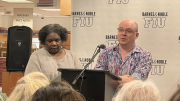Photo by Paul H. via Wikimedia
Sandeep Varry/Contributing Writer
“Can tech rebuild the middle class and American dream in the 21st century?” Well, before you try to answer that question, answer this, what exactly does that question have to do with the immigration reforms? If you are done taking a shot at them, let me lay out the answers for both these questions. In a room filled with tech savvy people with foreign passports, a panel of five sat down to discuss the importance of the U.S. immigration reform.
FWD.us, as stated on their website, is an organization which was started by key leaders in the tech community to promote policies to keep the United States and its citizens competitive in a global economy—including comprehensive immigration reform and education reform. After seeing an initial success in San Francisco, the organization picked Miami to promote the initiative, and the question mentioned at the beginning of this article is what they chose to name this event.
The choice to pick Miami was not that hard, remarked the event’s moderator Joe Green, who is also the President and Founder of FWD.us. Green expressed that apart from Silicon Valley, Miami is one of the very few cities in the U.S. which has a great concentration of tech savvy immigrants. Before introducing the members of the panel, Green invited Antón Chalbaud–an Argentinian whose company was picked by Facebook to be its first preferred partner in Latin America–to share his personal immigration story.
The event was held on Monday evening at Venture Hive, a central hub for startup groups and entrepreneurs, whose founder and CEO Susan Amat was also part of the panel. The other panelists included Tony Villamil, a research professor and dean of the School of Business at St. Thomas University who is also a member of the President’s Advisory Committee in Washington, D.C. and Diane Sanchez, the CEO of the Technology Foundations of the Americas. Last but not least, Seth Cassel who is currently the president and partner of EveryMundo, which provides multilingual online marketing strategy implementation services.
Taking the stage first, Villamil strongly emphasized the importance of smart immigration reforms. He remarked that special attention is needed towards getting the youth of this country educated, especially in the STEM fields, science, technology, engineering and mathematics. He expressed that the tech and entrepreneurs should work together to achieve this goal in the post industrial economy. On slightly contrary lines, Cassel pointed out that untill the new generation of school kids graduate with tech degrees, the U.S. should attract the best brains from all around the world and create the necessary market into which the American tech graduates can join and contribute.
Cassel said that in his company EveryMundo, around 25 employees were non U.S. citizens while only four were born in America. Cassel expressed the dynamic nature of what he referred to as “the online ecosystem” and the importance of staying updated on the latest in technology. He sadly remarked that instead of trying to retain the talent which comes to the U.S from all around the world, the present immigration system is standing as a barricade between the outside talents and inside growth.
Diane Sanchez, who agreed with Villamil’s strategy, also added that the U.S. needs to focus on an immediate solution to train workforce in special skills which are in demand. Amat singled out the importance of Miami over other tech cities and stated that Miami is not only becoming a center for technology, but is also a very welcoming place to live with families. She also added that “if we [Miami] can’t support them [techies], we will lose them to Silicon Valley.”
Attendees Diego Santivañez and Yosaf Zeyed, born in Peru and Libya respectively, exclaimed that they were excited to know about the event and have been following FWD.us online. Santivañez, who is a Chef and Zeyed, who is an anesthesiologist at Jackson hospital, collectively expressed that they were primarily attending to know how they can take part in the reform and get benefited in return. Marcela Ganem, one of the 25 non-American employees at EveryMundo and an FIU alumni who loves Miami and contributes to the U.S. economy by paying the same amount of taxes as a U.S. citizen would, can’t help feeling like an outsider every time she comes back from a trip to her native country, Mexico, when she has to pass through the immigration check.
During the concluding remarks, Amat strongly advised the new startups and entrepreneurs to consider the equity incentive plans which make the employees a part of the growth. Villamil resonated the same advice and asked to push for smart immigration reforms. Green, as a part of his concluding remarks, said that everyone can help by sharing their stories and in turn push the Congress towards passing the immigration reforms. Overall it was a great turnout and instead of dealing solely on the topic of immigration, the event embedded the role of technology and the tech savvy workforce in building the future of America, and explored how immigration reform can help achieve this goal.






Be the first to comment on "Technology rebuilds our communities"